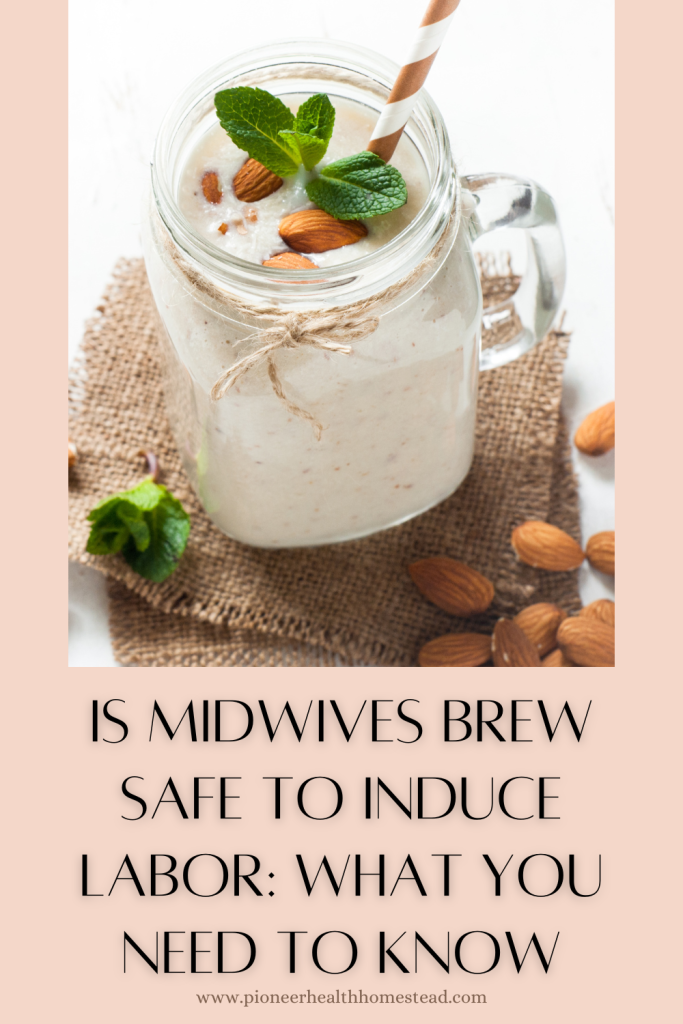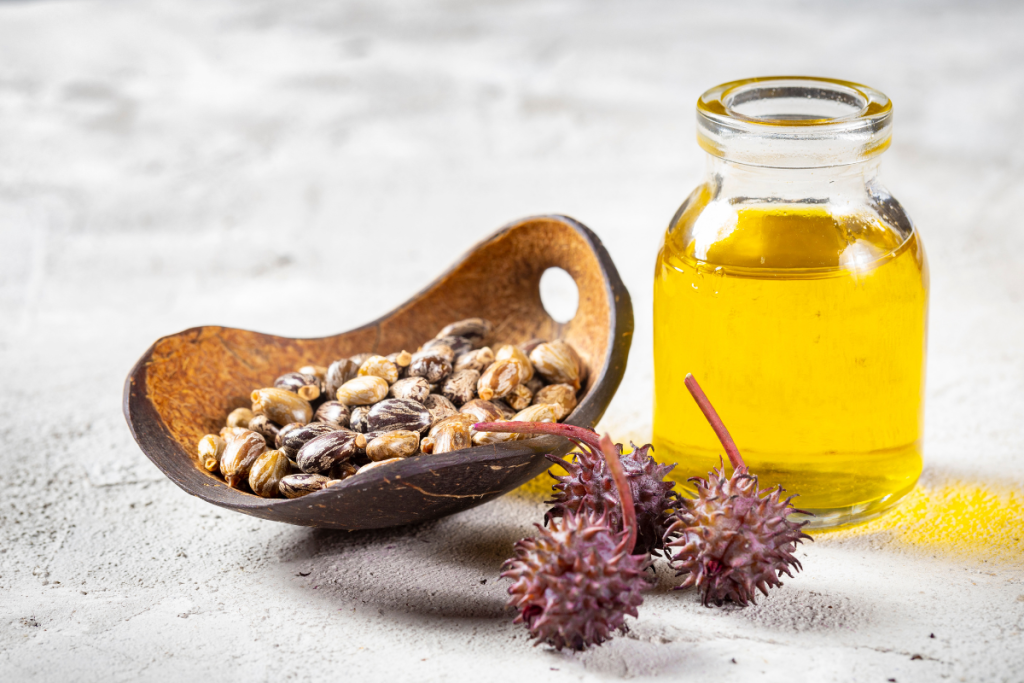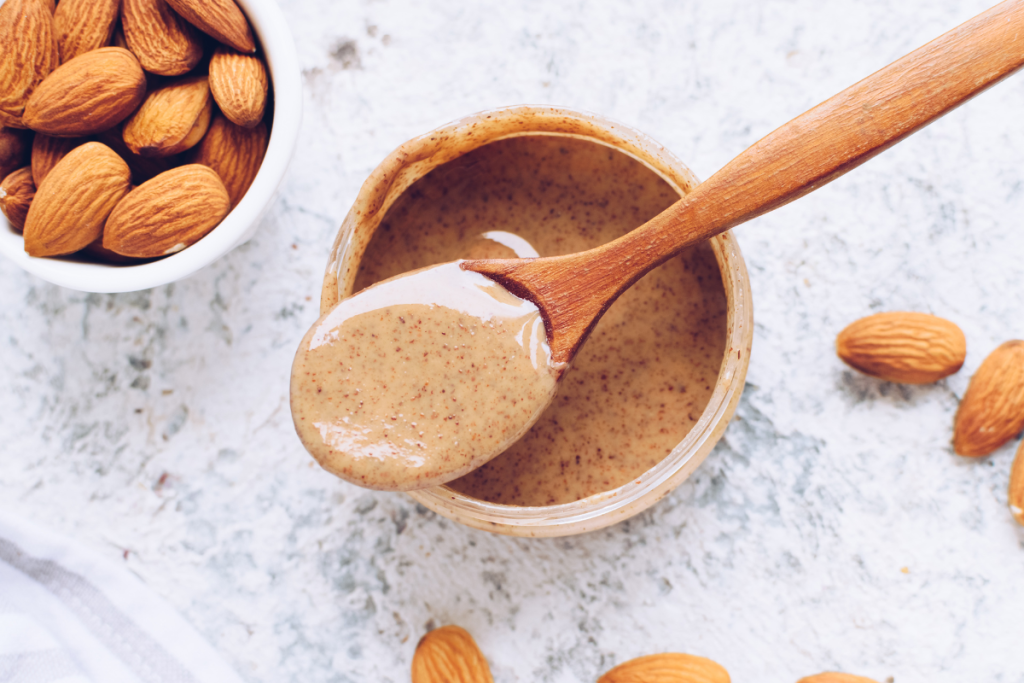Is Midwives Brew Safe to Induce Labor: What You Need to Know
In this article, I will answer whether the midwives brew is safe, what it is, why a woman could or should not take it, and the recipe for those wanting to try it out. I will also discuss some other things to consider such as when a woman is safe to take it during pregnancy and why a woman would choose a natural induction at home instead of opting for a hospital medically induced induction.
While I am a registered nurse (RN, BSN), I am not a medical doctor. Please take this education and speak with your healthcare provider before deciding whether to take the midwives brew or not.

What is midwives brew?
The midwives brew, also known as the German midwives cocktail or German labor cocktail, is a drink made at home to naturally induce labor. It consists of 4 ingredients: apricot juice, castor oil, verbena tea, and almond butter. In my research, I have found that it’s said to be an 85% success rate. I have not seen any statistics or a study specifically on this recipe itself, but from reading research on castor oil itself and having experienced it myself, I believe it’s a higher effective rate than 85%. The key to it being successful in my opinion is that it’s taken after 40 weeks pregnant. Your body will be nearing going into labor on its own most likely, and this just gets you jump-started.

What is an induction?
An induction prompts the uterus to contract before labor has begun. It starts the uterine contractions and begins active labor.
There are several medical methods and natural methods used to induce labor. I will discuss medical induction later in this article below.
Taking the midwives’ brew is considered a natural induction method. Many women prefer to try this before having a medical induction at the hospital if having a low-risk pregnancy.
Break down of it’s ingredients
The common recipe ingredients for this midwives brew may be natural and normal, however, there is always something to consider when taking anything while pregnant. The most common side effects of the midwives brew are nausea, diarrhea, and painful contractions. The ingredients are detailed and broken down below.
Active ingredients:
Castor Oil
Castor oil is the main ingredient. It comes from the castor bean and is best known for its work on smooth muscles in your bowels, which is the same type of muscle of a woman’s uterus. There is scientific evidence from researchers who have discovered that ricinoleic acid, the main fatty acid in castor oil, binds to receptors on the smooth muscle cells of intestinal walls. This is what causes those muscles to contract and push out stool. It is the same mechanism of action for use on the smooth muscle of a woman’s pregnant uterine muscles.

A study of the Effects of Castor Oil on Cervical Ripening and Labor Induction was done and found that oral administration of castor oil is effective for cervical ripening and labor induction. A midwife or doctor should follow up with the pregnant woman who plans to take it and make sure that there are no harmful side effects that could affect the mom or baby.
You should not take castor oil until you are no less than 40 weeks gestation, full term, and are a low-risk pregnancy.
While most pregnant women are not taking medications, there are always a few exceptions. If you are, please see this list to help you better determine if this natural induction would be safe for you. Castor oil may result in negative side effects and may not be right for you if you take certain medicines, including:
- diuretics
- antibiotics, including tetracycline
- bone medicines
- blood thinners
- heart medicines (cardiac)
Side effects and cautions for castor oil
Castor oil can work very quickly. You should see results within two to six hours after taking it, on average about four hours. Because castor oil works so fast, it’s not a good idea to take it before bedtime. The best time to take it is in the morning, this specific recipe requires an empty stomach.
In addition to having what many consider to be an unpleasant taste, castor oil can cause cramping and diarrhea. It can also reduce the absorption of nutrients in your intestines. This is why if you decide to use this midwives brew, you should only take it once every few days if it didn’t work the first time. You will need to be hydrated before taking this and then continue to drink lots of water after taking it to prevent dehydration.
As always, make sure to discuss all of this with your medical provider to help determine what will be safest for you and your baby.
Apricot juice
Apricot juice comes from Apricots (Prunus armeniaca) which are stone fruits also known as Armenian plums. These are very nutritious and high in vitamins. Apricots have a strong flavor and can aid in covering up the taste of castor oil. There is evidence that apricots can aid in improved digestion and boost gut health. These are high in potassium and will aid in helping to replenish your potassium reserves which often become depleted from diarrhea and dehydration.
If you do not like apricots, you can substitute this with pineapple, mango, or orange juice.

Almond butter
Almond butter is a very thick nut butter most of us are familiar with and is high in protein. Because it is a thick nut butter, it can bind with the castor oil well enough to hide the taste. You can substitute it with peanut butter, however, it may not bind as well.

If you are allergic to nuts, consider an alternative that would be thick enough to bind to the castor oil and hide its flavor.
Lemon Verbena tea
Lemon verbena (Aloysia citrodora), also known as lemon beebrush and lippia citriodora, is a perennial shrub that belongs to the plant family Verbenaceae. It is a tea that has been used to help digestion by soothing the stomach with its antispasmodic properties and relaxing the gastrointestinal tract. It can help alleviate symptoms of irritable bowel syndrome, indigestion, cramps, or bloating, allowing the digestive tract to work normally. This should help lessen the side effects of the castor oil on your bowels, while still allowing it to work on your uterine muscles creating uterine contractions.

Check out my resource page for best places to buy herbs and equipment.
Gestation and estimated due date
The midwives’ brew should not be taken before 40 weeks gestation. Expected due dates (EDD) are only guestimations and not at all foolproof. Only about 10% of women deliver on their EDD.
Even those who have had fertility treatments to conceive should not take this before 40 weeks as their baby may not be ready. No one truly knows what makes a woman go into labor. There are guesses but I have yet to find a clinical study or scientific studies proving a trigger for labor.
Why would someone want or need to be induced?
If you’ve ever been pregnant, you know that towards the end of your pregnancy, you can get a bit “done.” A lot of women often take straight castor oil under the advice of other moms. This is not sound advice and should be ignored.
Another reason is when you are nearing your 42 weeks of pregnancy time frame and the threat of a hospital medication induction looms over you.
There are medical reasons to be induced such as preeclampsia, gestational diabetes, issues with the placenta, and a uterine infection. There are more reasons practitioners will want you to have an induction, but they may be more policy and for their convenience than scientifically founded. I encourage you to research any reason your healthcare provider gives you to be induced and make a truly informed decision.
Hospital induction process: is it safe?
The main medication used in a hospital induction is pitocin. Pitocin is a synthetic version of a hormone called oxytocin. During the end of pregnancy, the release of oxytocin stimulates the muscles of the uterus, causing contractions and essentially active labor.
Like any medication, there are side effects. I won’t go into the side effects and risks vs benefits in this article, but I encourage you to do your research on this matter so that you are better prepared should this be brought up.
Why a midwife would recommend this induction method
A midwife may recommend this if the state does not allow women to go beyond 42 weeks gestation. For example, here in California, a woman must deliver between 37-42 weeks to deliver at home. Otherwise, they must be at the hospital. A woman wishing to have a home birth may want to attempt this before 42 weeks to stay within the law.

Is midwives brew safe?
In my opinion, if you are over 40 weeks gestation and have a low-risk pregnancy, yes it is safe.
However, hydration must also be considered both before and after taking the midwives brew. Dehydration can cause fetal distress, increased heart rate, and more.
Always make sure to discuss the use of midwives brew with your healthcare provider before taking it.
Midwives Brew Recipe
In all of my research, I did not find any different recipes other than the substitutions. If you have a nut allergy you can substitute the almond butter with another like ingredient. The purpose of the almond butter is that it is very thick and binds to the castor oil well when blended together.
The best way to take the midwives brew is at room temperature, but you can drink it over ice. There are many reports of women not being able to keep this drink down or even drink it entirely. The taste of the castor oil is very strong and can induce vomiting in some women. What woman isn’t more taste and smell sensitive while pregnant?
The best time to take this is in the early morning on an empty stomach at the end of your pregnancy, 40 or more weeks gestation.
The most important thing to remember when deciding to take this or not is to stay hydrated by drinking plenty of water before and after. If you have been dehydrated recently this may not be a good idea for you to attempt. Remember to discuss this with your healthcare provider beforehand.
Check out my resources page for my favorite places to get herbs and other items.
Recipe and Directions:
- 10 oz Apricot juice
- 8 oz Verbena tea
- 2 T Alond butter
- 2 T Castor oil (food grade)
Directions:
- Brew the verbena tea for no less than 15 minutes.
- Mix all ingredients in a blender.
- Drink at room temperature or over ice if desired.

Midwives Brew
Equipment
- 1 Tea pot
Ingredients
- 10 oz Apricot juice
- 8 oz Pure lemon Verbena tea
- 2 T Castor oil food grade
- 2 T Almond butter
Instructions
- Brew the tea and allow to steep for at least 15 minutes.
- Add all ingredients to a blender and blend until smooth.
- Add to a glass and drink on an empty stomach
Notes
Other natural ways to get labor started
Other ways are shown to help prepare a woman’s body for labor and potentially start labor. Some of these are “old wives tales” but I don’t see how they can hurt you to try unless you have a medical condition preventing your ability to do so.
- Nipple Stimulation
- Walking
- Sex
- Pineapple or pineapple juice (can substitute it into the midwives brew!)
- Spicy food
- Acupressure
- Essential oils
My castor oil story
For my fourth pregnancy, I decided to take castor oil in a smoothie. I was over 40 weeks pregnant and in a lot of pain from my sciatica so I decided to try and induce labor and a friend was nice enough to give me her recipe. Unfortunately I had not heard of this midwives brew before. I was given a recipe of pineapples, pineapple juice, castor oil, and almond butter.
Unfortunately, I was not told, nor did I do any research (shame on me!) about castor oil. I of course knew it would likely give me diarrhea but nothing about what time of day to take it. I made the smoothie and took it around 5 pm. Within two hours I was going to and from the bathroom with severe diarrhea and contractions had begun.
Let me tell you, out of 5 of my labors, this one was by far the worst pain I remember experiencing.
This was my second home birth so I was prepared to have a natural delivery without pain medication. These contractions were so strong I remember wishing I could have an epidural. I had a very quick precipitous birth and had a healthy baby girl.
After this experience, I will generally caution women who consider it unless it is necessary. The use of castor oil should be considered for those who truly need to try a natural induction and not just hurry up and have their baby.
You can read about my recent positive home birth story.






